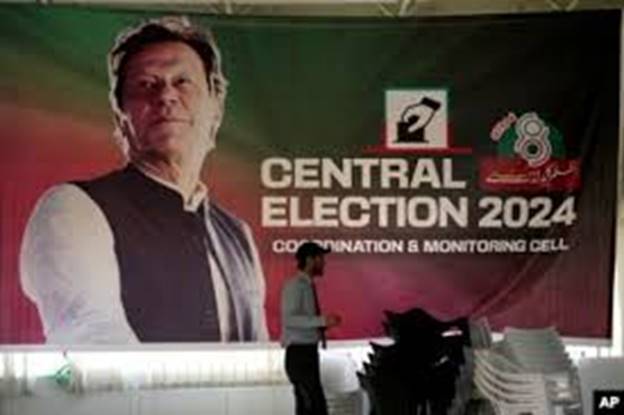

Khan’s party was almost entirely dismantled after his supporters attacked military installations in the wake of his arrest on corruption charges in May. But subsequent convictions and prison terms in three trials did not break the ex-leader’s popularity and may even have bolstered it
In Pakistan, Khan’s Shadow Looms
By Shaiq Hussain and Rick Noack
Islamabad, Pakistan
Pakistan’s Parliament elected Shehbaz Sharif to a second term as prime minister Sunday, handing the country a reprieve after months of political turmoil. But analysts and Sharif’s opponents say the respite won’t last long.
Sharif, whose Pakistan Muslim League (PML-N) party has no absolute majority in Parliament, struggled to find political allies in the wake of last month’s general election . Pakistan has been led by a caretaker cabinet since August, when the Sharif-led government completed its term, paving the way for the election.
For now, Sharif’s government is being backed by a range of rivals.
It will face particularly fierce resistance from allies of imprisoned former prime minister Imran Khan, who vastly exceeded expectations last month and whose emboldened supporters staged nationwide protests Saturday.
On Sunday, Sharif beat Omar Ayub Khan, the candidate backed by Khan’s party in a 201-to-92 vote.
After his victory, Sharif urged Parliament to “come together.” But his speech was drowned out by Khan’s allies, who called Sharif a “thief,” accusing him of stealing their votes.
Sharif’s term is likely to be overshadowed by lingering allegations of electoral fraud from Khan’s Movement for Justice party, or Pakistan Tehreek-e-Insaf (PTI), which appeared to have a commanding lead in unofficial polls released immediately after voting stations closed Feb 8.
Khan’s allies claim that Pakistani officials, shocked by the strong public support for the imprisoned ex-leader, slowed down vote counting and rigged the results — an accusation that the authorities have denied. But even among Khan’s opponents, the sentiment that fairness is lacking in Pakistani politics remains widespread.
“While we now have a government that faces serious credibility issues, the challenges ahead are huge and daunting,” Mustafa Nawaz Khokhar, a political analyst and former lawmaker, said in an interview.
Pakistan faces one of its worst economic crises in decades and a growing number of militant attacks. But analysts say that Sharif’s second term may look much like his first, which lasted only from April 2022 until last August and was defined by concerns over economic stagnation and opposition criticism that the government lacked a clear agenda.
He was also not the Sharif most people had expected to win. In the weeks before the election, his older brother, three-time prime minister Nawaz Sharif, had led campaigning and appeared to be the preferred candidate by the military, which is widely seen as the ultimate arbiter of politics here.
But Nawaz Sharif’s pro-business campaign, which bore striking similarities with the platform he ran on over the past decades, did not gain much traction. He not only failed to garner an absolute majority, but also fell behind Khan’s allies, who are now the biggest political bloc in Parliament despite what was widely seen as an unprecedented state crackdown against them.
Khan’s party was almost entirely dismantled after his supporters attacked military installations in the wake of his arrest on corruption charges in May. But subsequent convictions and prison terms in three trials did not break the ex-leader’s popularity and may even have bolstered it.
Nawaz Sharif is likely to retain a strong influence on his younger brother and on the direction of Pakistan’s next government, as it seeks to find a response to public sympathy for Khan and his party’s appeal.
The PTI’s savvy use of social media in recent monthssuccessfully circumvented efforts to undermine Khan’s populist pitches to voters, which largely revolve around disrupting the status quo of Pakistani politics and building a nationalistic European-style welfare state based on Islamic values.
Khan and his party “have changed the dynamics of Pakistani politics and remain the elephant in the room, a force to be reckoned with, a force that cannot be wished away,” said Mushahid Hussain Sayed, a Pakistani senator long allied with Sharif’s party.
One of the key questions is whether Pakistan’s establishment will allow Khan’s party to regain a seat at the table, potentially paving the way for Khan’s release and political comeback.
On the regional level, the PTI appears to have been given some space since the election. Officials did not prevent a Khan ally from being elected head of the government in Pakistan’s northern Khyber Pakhtunkhwa province, where his party dominated the elections.
While Khan’s party still appears far from dominating on the national level, there are signs that last month’s vote has upended the status quo.
Party leaders and supporters who had gone underground amid fears of arrest have resurfaced. On Pakistani television, talk show hosts and guests now openly discuss electoral fraud allegations. And after months in which most television channels barely, if ever, mentioned the PTI or Khan, its members are being invited back onto programs.
“No one can stop us,” said Muhamad Jamshed Khan, a lawyer who attended nationwide PTI demonstrations Saturday to protest alleged electoral fraud. “Not only will we get Khan out of prison, but we will also make him prime minister again.”
*Noack reported from Paris. The Washington Post

